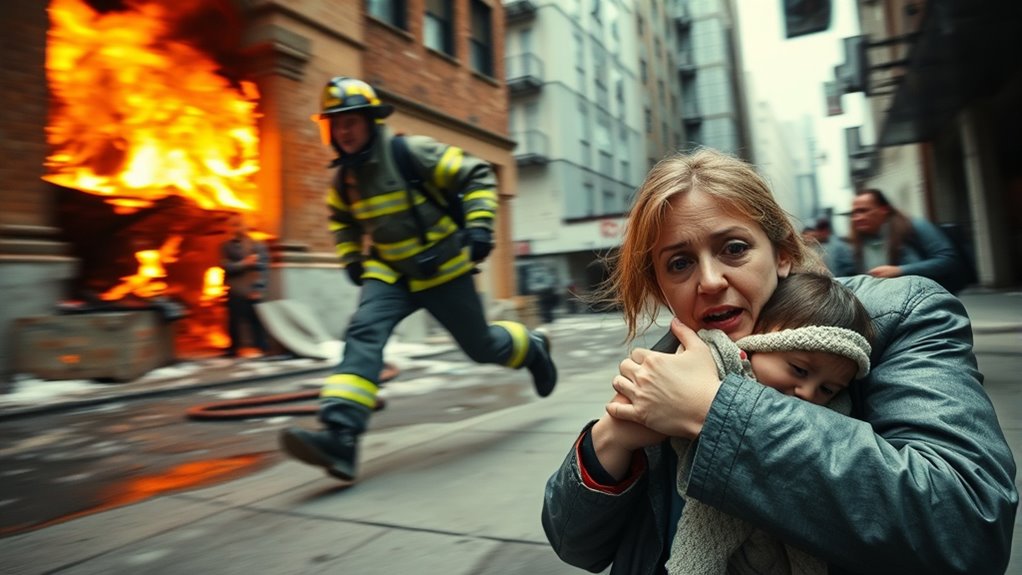During emergencies, your brain’s neural response speeds up to help you spot vital details. The amygdala processes fear and alerts other parts of your brain, while the locus coeruleus releases norepinephrine to boost alertness. This overclocking stretches your perception of time, making events seem longer so you can react quickly. If you want to understand how your brain adapts during high-stress moments, keep exploring the fascinating mechanisms behind time perception.
Key Takeaways
- During emergencies, the amygdala heightens emotional processing, influencing other brain areas to extend perceived time.
- Neural activity increases in response to danger, slowing the brain’s internal clock to enhance awareness.
- The surge of adrenaline and norepinephrine amplifies neural responses, making details seem more prolonged.
- Heightened alertness causes the brain to scrutinize surroundings more carefully, stretching perceived duration.
- This neural overclocking ensures vital information is processed thoroughly during high-stress situations.

Have you ever wondered why time seems to fly by during moments of joy but drags when you’re bored or anxious? Your perception of time isn’t just a passive experience; it’s shaped by complex neural mechanisms that respond to your emotional state and environment. When you’re in a high-stress situation or facing danger, your brain activates an adrenaline response, triggering a cascade of neural activity designed to prepare you for quick action. This surge of adrenaline influences how you perceive time, making moments feel longer than they actually are. Your brain essentially slows down its internal clock, giving you the illusion that more time has passed, which can be vital for making split-second decisions. This heightened state of awareness helps you process more information in the moment, which is why you might feel like you’re experiencing everything in slow motion during emergencies.
The neural mechanisms behind this phenomenon involve several parts of your brain working in concert. The amygdala, known for processing emotions like fear, plays a key role in amplifying your response to danger. When it detects a threat, it communicates with other brain regions, including the prefrontal cortex and the locus coeruleus, which releases norepinephrine—a chemical that heightens alertness and focus. These neural pathways collectively enhance your perception of time, making even brief moments seem elongated. Essentially, your brain is overclocking itself, prioritizing survival by allowing you to scrutinize your surroundings more carefully. This process is instinctive; it’s your body’s way of ensuring you don’t miss vital details when it counts the most. Additionally, research shows that high alertness states further modulate your internal clock, emphasizing how critical your neural responses are in shaping your experience of time.
This adrenaline-driven change in time perception isn’t limited to extreme situations. It’s also why stressful or anxious moments can make time feel slower in everyday life. When you’re worried or tense, your neural mechanisms are on high alert, and your internal clock appears to run faster, stretching out those unpleasant moments. It’s a survival mechanism that keeps you alert and ready to react. Conversely, during positive or relaxed states, your neural activity isn’t as heightened, so time tends to seem to pass more quickly. This variability in perception isn’t just psychological; it’s rooted in the intricate neural responses to your emotional and physical environment, demonstrating how intimately your brain’s mechanisms influence your experience of time.
Frequently Asked Questions
How Does Adrenaline Affect Our Perception of Time?
Adrenaline impact on your body causes perception distortion, especially during emergencies. When adrenaline floods your system, it heightens your awareness and sharpens your senses. This rush makes time seem to slow down because your brain processes more information in the moment. As a result, you perceive those seconds as longer, giving you extra time to react. So, adrenaline fundamentally alters your perception of time, helping you respond more effectively in critical situations.
Can Training Change How We Perceive Urgent Moments?
Imagine sharpening your senses through perception training and stress management; it’s possible to alter how you experience urgent moments. By practicing these skills, you can become more composed and attentive, which helps you process time more accurately during high-pressure situations. While you can’t entirely control how time feels, training enhances your awareness, making intense moments feel more manageable and less overwhelming, ultimately giving you an edge in critical moments.
Do Different Age Groups Experience Time Dilation Differently?
You might notice that different age groups experience time dilation differently due to age-related perception and developmental differences. Younger people often perceive time as moving faster, while older individuals may feel it slows down during intense moments. These variations occur because your brain’s processing and attention abilities change with age, affecting how you perceive the duration of events. Understanding these differences can help you better grasp how time perception varies across life stages.
How Does Sleep Deprivation Influence Emergency Time Perception?
When you’re sleep-deprived, your perception of time in emergencies can seem wildly distorted, almost like your brain’s dealing with a cosmic joke. Sleep deprivation fuels cognitive distortion, making every second stretch into eternity. You might feel like minutes pass in a blink or an hour drags on endlessly. This altered sense of time messes with your judgment, heightening stress and confusion when quick decisions are vital.
Are There Cultural Differences in Perceiving Time During Emergencies?
You might notice that your perception of time during emergencies varies across cultures. Cultural narratives and societal norms shape how people react and interpret stressful moments. In some societies, emergency responses are more collective, which can alter how long a situation feels. Your cultural background influences whether you perceive time as slowing down or speeding up, highlighting the deep connection between cultural context and how you experience urgent events.
Conclusion
In emergencies, your mind becomes a camera zooming in on every flicker of detail, stretching seconds into endless chains. Time feels like a thick fog, slow and heavy, as your senses sharpen and stretch each moment into eternity. Remember, your perception is the artist painting reality with bold strokes of adrenaline and focus. When seconds seem to crawl, it’s your brain’s way of holding onto every precious fragment—turning fleeting moments into an unforgettable canvas.









